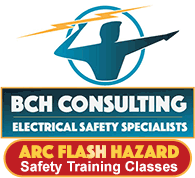Here is a little background about the guidelines we work with. They will help explain why you need an evaluation:
Rozel’s service proposals are written in accordance with the requirements of the National Fire Protection Association’s standard NFPA 70E. This is the nationally recognized standard for electrical safety in the workplace. The National Electric Code (NFPA 70) is a standard that ensures the safe installation of electrical systems in dwellings and buildings. NFPA 70E is the NEC’s “sibling” and should be enforced the same way as the NEC.
OSHA provides a “general duty clause” – Each employer shall furnish to each of his employees employment and a place of employment which are free from recognized hazards that are causing or are likely to cause death or serious physical harm to his employees. It’s a short statement but carries a lot of weight.
OSHA was instrumental in creating NFPA 70E due to the complications of changing federal statutes on a three-year cycle. The purpose of NFPA 70E is to help serve the needs of OSHA by codifying a set of standards that they can reference and that will also stay current and applicable.
Taken from the forward of NFPA 70E: “The committee was formed to assist OSHA in preparing an electrical safety standard that would serve OSHA’s needs and that could be expeditiously promulgated through the provisions of Section 6(b) of the Occupational Safety and Health Act..”
Concerning electrical systems, there are two hazards: “Shock” and “Flash”. Both of these hazards must be identified in order for the requirements of the general duty clause to be met
With electrical shock hazards, it is straight forward to verify the voltage of an electrical component and thus protect yourself from the hazard with appropriate methods.
Unfortunately, arc flash potential is not that simple. You must calculate the incident energy to satisfy the requirement for selecting appropriate PPE and determining how to work around the hazard.
NFPA 70E was developed and tailored to fulfill OSHA’s responsibilities. They say you must recognize hazards and protect yourself accordingly; and that you must perform a hazard assessment. This is what an arc flash hazard analysis is. Following OSHA means you must follow NFPA 70E.
[activecampaign form=3]






